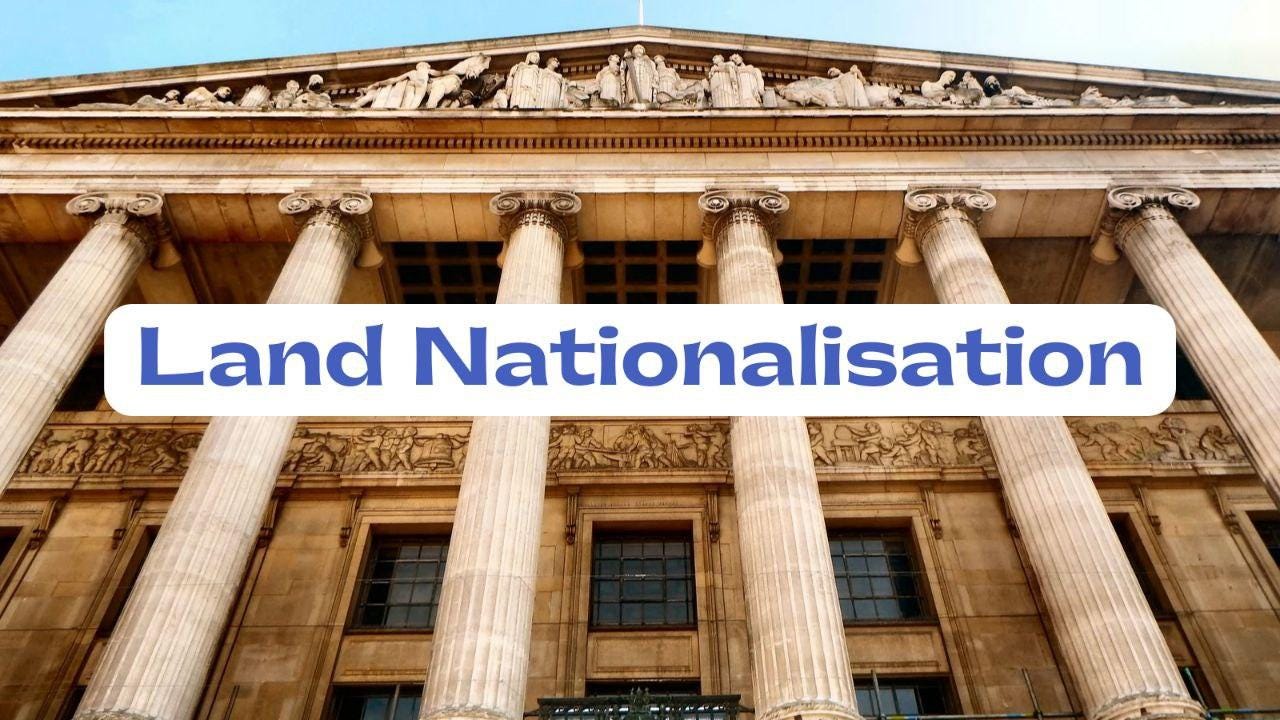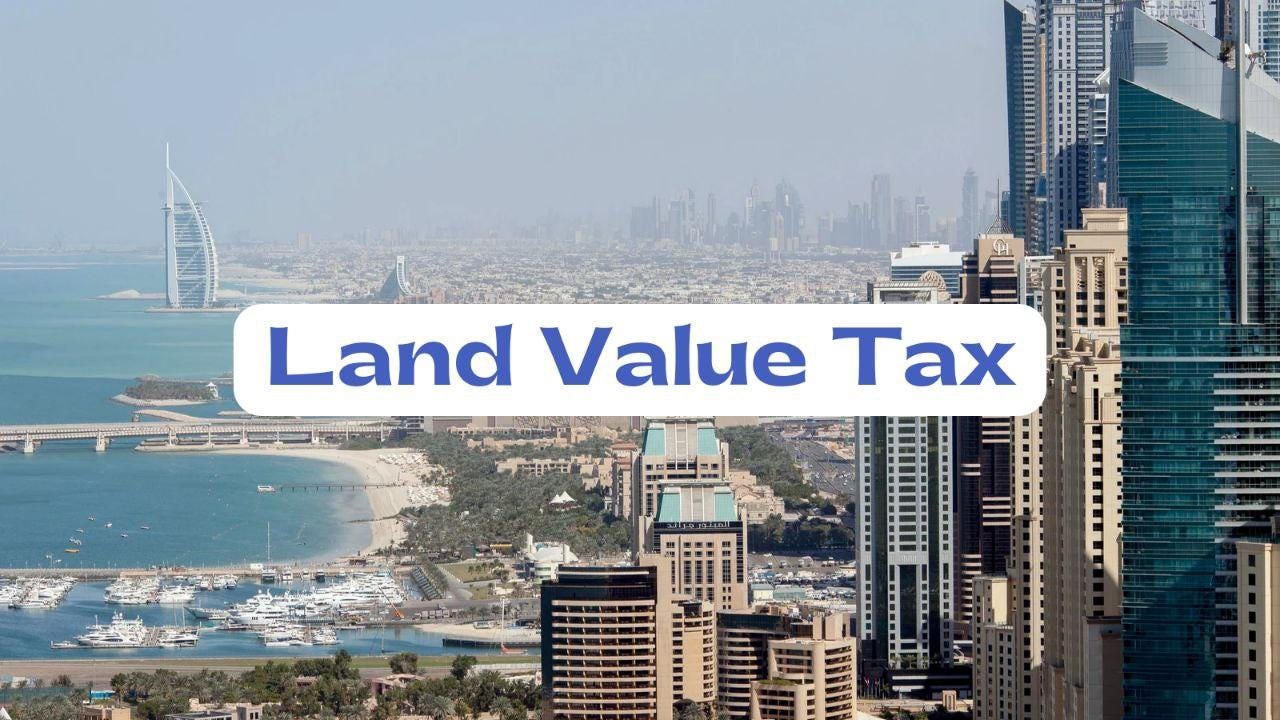How to Revive South Africa
Disputes over post-colonial land ownership have riven South African politics for decades. Georgism provides the only productive way forward.
South Africa has a long and contentious history with land ownership and property rights. Current land ownership patterns remain unchanged from the colonial and Apartheid era, with white South Africans owning over 80% of the land in the country while making up less than 10% of the total population. This vast inequity is the result of the era of colonization, during which first the Dutch and later the British waged continuous wars on native African people and confiscated their land for settlers and government projects. After colonization, the South African government passed laws that for decades prohibited the ownership of land by Africans, such as the Native Land Act. Conflict over who has the true right of ownership to the land has divided South African politics since long before its birth as an independent nation.
The Land Dilemma
President Nelson Mandela is everywhere remembered as a peace builder. In his life, he promoted a number of relatively radical policies intended to remedy what he viewed as injustices in land ownership, although these policies are often forgotten or deliberately overlooked. One such example is the policy of nationalisation.
The nationalisation of the mines, banks, and monopoly industries is the policy of the African National Congress (ANC), and a change or modification of our views in this regard is inconceivable.
Nelson Mandela, 1990
Despite Mandela’s assurances, the African National Congress soon discarded land nationalisation as a policy priority. After the fall of the Berlin Wall and the USSR, the global winds of privatisation were too strong; South Africa could not go any other direction. The right to private possession of land and natural resources was enshrined in the new democratic constitution and treated like a sacred cow. This calmed the finicky investors and markets, but never addressed the issue of Apartheid land dispossession, land hunger and wealth inequality. As something of a consolation prize, South Africa was able to host the Fifa World Cup in 2010.
In spite of questionable decisions about land policy, the South African economy grew rapidly from 1994 to 2014, benefitting from the lifting of Apartheid sanctions and the mineral boom. For a while, prosperity was able to paper over the worst frustrations with the nation’s inequality. However, once growth had slowed, the societal cracks of landlessness and poverty became ever more visible.
The Economic Freedom Fighters (EFF), a party formed by former ANC politicians, brought the land question back into South African political discourse. As a pan-African leftist/socialist party, it proposed the expropriation of land without compensation and declared that the land belongs to black South Africans. EFF’s basis for not continuing the previous policy of “willing buyer, willing seller” is that the land was originally stolen from Africans; compensating thieves or their children would be unprincipled and unjust.
Other figures from non-profit organisations and think tanks argued that the land does not belong to Black Africans, but to the Khoi & San people (South Africa’s First Nation people). This dismissed the ownership claim of black South Africans. For context, black South Africans are 80% of the population and Khoi & San people are less than 1%.
Various other groups also claim that they are the only rightful owners of certain portions of the country. South Africa is very diverse, with 12 official languages, and has many areas that are completely dominated by a particular clan or culture, the result of Apartheid governments placing clans in different reservations (the Apartheid government learned a lot from the Americans and Australians and their treatment of Native Americans and Australian Aboriginals). Each of these groups has its own argument for why they deserve ownership of the land.
In a way, everyone who claims South African land is both right and wrong. The land is our common inheritance—it does not belong to any one racial or cultural group. Rather, all should share equally in the bounties of the Earth.
The Vital Role of Land
It is important to understand the crucial role land plays in the economy. Human society is entirely dependent on land. On it, we build the homes in which we live and the factories with which we produce our goods. We farm it for food, mine it for resources, and use its forests for our building materials. Even the rivers which provide us with fresh water and electric power all rest on land. Ultimately, land is the source of all of our wealth- it is the prerequisite for labor and capital. Even the philosopher must have a place to stand before he can move the Earth.
While land as a factor of production is often minimised as only important to agriculture, ultimately every human product comes from the land. The most valuable land is not agricultural at all. Due to urbanisation, millions of South Africans live in cities, where the most valuable land in the country is located. Urban land provides access to potential retail customers, workers for factories and offices, tenants for housing developments, and in general the ability to leverage the vast labor and capital of the urban community. This higher value is what underpins the high rents paid in urban areas.
Currently, the vast sums of land rents generate in South Africa go into the pockets of landowners, to the detriment of both the economy and the society of the country. That needs to change.
Land Nationalisation vs Land Value Tax:
There are only two policies to implement if we want to ensure that those that have been excluded can benefit from the land: land nationalisation or a land value tax. Both are just solutions to the unequal access to and ownership of land that is the consequence of colonialism, racism, and subsequent history.
Land Nationalisation
Nationalisation of all land into state ownership or custodianship is difficult to execute well. However, this is not to say that it cannot work.
The most successful example of land nationalisation is Singapore. In the 1960s, the Singaporean government bought land parcels from private landlords with compensation set by the state (with little room to negotiate). Most Singaporeans live in state-built housing and on state-owned land. Yet, Singapore consistently scores high on Economic Freedom indices. In fact, Singapore ranks first in the 2022 index of economic freedom. This proves nationalisation can be done within a market economy without hindering economic resilience.
In most cases, nationalisation goes wrong because the process becomes corrupt. Unscrupulous politicians, bureaucrats, and property developers are all too happy to place their thumb on the scales of land leases, handing out parcels to donors, family and friends. Singapore was successful because the government earned the trust of citizens: the nationalization program proceeded under the stern eye of Lee Kuan Yew, who brooked no hint of corruption, favoritism, or self-service. Unfortunately, South Africa is plagued with corrupt politicians who have never kept a significant promise. Strikes and public activism for housing, better public services, and employment are commonplace.
In terms of financing expropriation, the South African government does not have the money to nationalise all land at ‘fair market value’. This is another reason for land expropriation without compensation, a process even more prone to abuse and corruption, and one that would shake the foundations of the South African economy. Banks, businesses, and academics have all voiced their opposition to this policy, claiming it would result in food shortages, capital flight, and increased unemployment. International economic organizations such as the IMF and rating agencies have all expressed concerns about land expropriation without compensation, essentially threatening credit rating downgrades and sanctions, all measures that would cripple the nation.
Taking such a path would likely result in South Africa ending up like its northern neighbour Zimbabwe, whose government of former guerrilla warriors implemented a lawless land reform policy that plunged the country into economic chaos and its people into obscene poverty.
There is another way though, a way that preserves the stability of a market economy but can still deliver land justice: a single tax on the value of land.
Land Value Tax
In place of land nationalization, the government of South Africa could put in place a land value tax. This tax would take a portion of the value of all of the land in the country and put it to use for the benefit of society generally. Rather than expropriating the land itself, a land value tax simply ensures that the benefits of land ownership are shared.
The money raised from levying a tax on the value of all land in South Africa could be seen as a kind of recurring reparations, a way for landowners to compensate society for excluding others from the use of the land. They can maintain the right to manage and use it as they see fit, but they must pay society for the privilege they receive. This turns the nation’s land into a continuous fund that can be used both to help alleviate the poverty and inequality caused by colonization and invest in creating a better future for coming generations.
Unlike nationalisation, a land value tax is far less susceptible to corruption. Land is being neither confiscated nor administered by the state, making it difficult to profit by handing it out as patronage or leveraging confiscation as a threat against political opponents. It is transparent, allowing politicians and their donors to be kept at arm's length. Most importantly, it allows for the continued private ownership and administration of land, not disrupting private property markets or agricultural production. In fact, it could easily increase economic activity, as vacant land that is sitting idle and undeveloped will be more costly to hold. Accordingly, a land value tax will not only share the benefits of the nation’s land with all, it will actually encourage higher productivity, creating jobs and spurring development.
For those who care, this policy is IMF/World Bank approved, as they have recently published papers on Land Value Capture. They recognize that public investment into much-needed infrastructure requires funds to be raised for capital expenditure and maintenance.
Another tax?
South Africa’s highest income tax rate is 45%, the tax on company profits stands at 28%, and the Value Added Tax (VAT) is levied at 15% on most goods and services. These rates are above the world average. Citizens feel taxed to the max already, how could adding a land value tax help?
Most of the taxes raised come from income taxes (39% of South Africa’s tax revenues), company profits (16.4%), and VAT (26.5%), with property taxes contributing a negligible amount (less than 3%). To build public support and be consistent with the philosophy of Georgism, income, company profits, and sales taxes should be gradually reduced and replaced by the LVT in a revenue-neutral manner.
A progressive implementation of LVT allows for an improvement in property valuation frequency, accuracy, and transparency and gives people and businesses sufficient time to adjust to the changes in the market. The beauty of Georgism is that this comprehensive restructuring of the economy can completely change the social dynamic of society without violence or turmoil: it is radical, but not revolutionary.
The ultimate goal should be to abolish all taxes other than those on economic land. Taxes on labor and capital, such as the income tax and the company profits tax, are both unjust and inefficient, punishing the worker for his labour and the entrepreneur for his successful creation of a business. By penalizing people for creating value, either by working or by investing, such taxes actively impede economic growth.
Labour and capital deserve their earnings, but the land belongs to us all.
Conclusion
In the quest for land justice, land nationalisation is not the path forward. It opens the door for flagrant abuses of power by the state and the well-connected. It threatens the economic welfare and food security of the country. It requires a competent state to implement it, which South Africa lacks.
LVT offers a solution that speaks to the challenges of a middle-income state trying to address its oppressive past while simultaneously developing a more prosperous future. It avoids a confrontation with global capital and ends the ‘rightful owners’ debate. It is the only solution that will allow South Africa to move forward into a just and prosperous future.








Good article! I've always thought that South Africa was particularly well suited to the Georgist message.
The idea that the great areas of land in a country are being held by a small proportion of the population and this is destructive to the opportunities these areas would otherwise provide, should be made more clear. We should better express this claim by the fact that it is the USEFUL SITES not simply the big areas of it that are being privitized. I suspect that were it based on the VALUE OF THE LAND being privitized and not just the proportion of its area, the resulting numbers would result in the associated facts in this explanation being even more extreem.